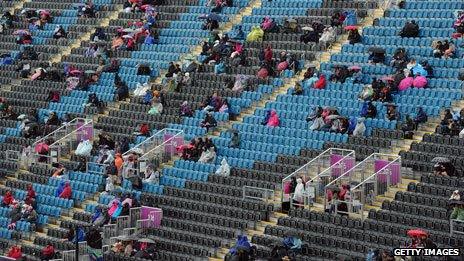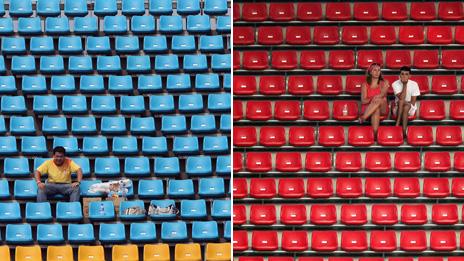Q&A on why seats at Olympic venues are empty
- Published

Empty seats at Greenwich Park, the equestrian venue
Seats have been left empty at the Olympic Games despite high demand when tickets were sold through a public ballot. Some are becoming available to buy or take up. Why? And how to get them?
Why are there empty seats at the Olympics?
Criticism has erupted as seats at the Olympic Games have been left empty and athletes have performed in front of less than capacity crowds from the first day of competition.
It is not just because of the Games' sponsors failing to take up seats, Games organisers Locog and the International Olympic Committee (IOC) have said.
Eight per cent of tickets have been made available to sponsors and 75% to the public. Another 12% go to National Olympic Committees and 5% to the Olympic family - people like IOC officials and the media.
The gaps are due to people from a range of those different groups not filling them, the IOC's Mark Adams has said.
"It doesn't appear to be a sponsor issue. Sponsors are turning up," Seb Coe said on Sunday. Locog has looked at who didn't turn up on Saturday and it was not predominantly the Games' corporate funders.
No-one should "run away with the idea" that large numbers of seats will be empty throughout the Games, he said, as people will settle in to their working patterns across the sites.
How do I get tickets from outside the Olympic Park?
Tickets for the Games did not sell out before it began. About 200,000 football tickets remain available and about 100-120,000 non-football seats are still on sale.
Other tickets will now be put up online for UK customers. All are available at the Locog tickets website, external.
Up to 1,000 tickets were released online in the last 24 hours across three artistic gymnastics sessions for Sunday. Locog saw some distinct blocks of seats were not being used at the North Greenwich Arena and put them online.
Locog will continue to monitor all sports and venues and put tickets on line throughout the Games, head of media Joanna Manning-Cooper said.
Tickets will be collected at a box office and sold on the internet because Locog feel that is more accessible - not just for locals and Londoners.
There are no further plans to release extra tickets for those outside the UK.
How do I get tickets from inside the Park?
Via three main ways:
Wimbledon-style returns will be made available at offices at venues or on the Olympic Park as and when they become available. Priced £5 for adults and £1 for children. On Saturday, 283 handball tickets were released in this way.
They come up when spectators leave early and return their tickets. Because they have a double-header - more than one session of sport to attend or because they have seen their team and go.
On the park during the Olympics there are up to 1,000 young people present under the "Key Seats" programme to involve young and local people and those who have played a part in their community, about 150 people each day. They are being allowed in when space comes up.
Locog will draft in other people who hold accreditation on the park to fill empty seats. So far that has been the troops who are not on shift handling security.
G4S staff, whose company was criticised after it failed to recruit enough people, had not yet been asked, but Locog is "looking at the whole mix of people" present and available, Ms Manning-Cooper said.
Seb Coe has denied it is "shambolic" to bring the Army in to fill seats after also using them to fill security staffing shortfalls.
"I don't think a single person out there would think it's shambolic to get members of the army and people like teachers, through the key seats programme, to go in," he said.
Has this happened at previous Olympic Games?

Lone Beijing spectator, 2008, and in Athens 2004, two fans among empty seats
Yes. One of the stark memories from Beijing is of row upon row of empty seats. Four years earlier, Athens had the same problem.
What do athletes think?
Athletes like cyclist Mark Cavendish have talked about the "wall of noise" from spectators, valuable to spur them on in competition.
"We want those seats filled," Colin Moynihan, head of the British Olympic Association, which looks after UK athletes, has said.
The government and Locog need to look at ideas such as a 30-minute rule, where seats are let go if no-one has filled them within half an hour of the session starting, transport delays permitting, he said.
Seb Coe says Locog has a "more considered" approach to the problem and a curfew might create more problems than it solves.
What are the sponsors saying?
"We are using all seats we have been allocated. They are taken by a mixture of clients and staff."
"We gave unallocated tickets we purchased back to LOCOG ahead of the start of the Games, so that they could be resold to sports fans who want to watch an event.
"The vast majority of the tickets we purchased were given away many months ago to the public through competitions and promotions or used as rewards for our employees for great pieces of work or excellent customer service."
"At Coca-Cola, we have given the majority of the London 2012 tickets that we were able to purchase as a Worldwide Partner away to the public via competitions and promotions that allowed them to choose the event they really wanted to attend, giving thousands of people the opportunity to participate in the greatest show on Earth.
"In addition to consumers, we have also invited some longstanding partners, employees, and customers to attend the Games. All of our guests are incredibly excited to be able to be a part of London 2012 and we believe that useage levels of our tickets have been extremely high so far."
"EDF has received no free tickets. We have paid for every ticket and are making good use of these with our customers, to reward employees, for our hospitality programme and for community groups.
"To date we have had only a handful of unused tickets and are working to ensure that as far as possible all our tickets are used, even up to the last moment. We will continue to work hard to make sure the seats we have paid for are used because we want as many people as possible to experience the magic of the Games."
"We are making use of the tickets we have purchased."
"None of our tickets are unused. A small number of our allocation has been used by ourselves, including as a staff incentive scheme and competitions for customers.
"Also as a commercial partner, we have been able to include these seats in some of those we've sold to the British public and businesses as Games Breaks. Any remaining were returned to Locog."